#remembering If the Emperor had Text-to-Speech
Text

“As with most members of the Ten Thousand, both the full name and the specifics of tribune Felis Silvestris Juvenilis’ service remain shrouded in mystery, known only to his fellow Custodians. What is known, however, paints him not just as a mighty warrior and a wise leader - both characteristics inseparable from the image of the Emperor’s own guardians - but also as a great administrator and diplomat - traits no less inherent to Custodians, but far less known beyond the walls of the Imperial Palace.
What meager records are available on the history of Adeptus Custodes suggest tribune to be one of the most senior serving members of the organization, the length of his vigil rivaling that of the most ancient of the Moritoi. It is said that amidst tribunes he is the one who manages the often overlooked supply and logistics aspects of Adeptus Custodes operations. While appearing somewhat unglamourous to an outside observer, these tasks are held in great respect by Custodians themselves, not in the least because they include the duty to oversee the process of selection, creation and training of new Custodians.
It is in duties of such caliber that tribune Felis is said to have excelled for aeons, and excelled to such a degree that, according to some, he is viewed as something of a father figure by many of relatively younger Custodians. Though extremely unverified, such rumors are somewhat supported by the fact that the latest election for the position of Captain-General saw tribune Felis as a popular candidate, beaten narrowly - rumors say by as little as three votes - by Trajan Valoris.
At the same time, it is evident that tribune’s service was not limited to internal matters of Adeptus Custodes throughout the eras. Several records name him as the custodian who brought Alicia Dominica before the Emperor to put an end to Goge Van Dire’s reign of terror during the Age of Apostacy. He also appears in much more recent imperial history, leading a delegation of Emissaries Imperatus to help negotiate peace after the disastrous events of the Damocles Crusade.
His most well-documented exploits, however, come at the break of the current era, as the Noctis Aeterna fell upon the Emperor’s domain. According to fresh tomes within the Imperial Archive, not long before the outbreak of Cicatrix Maledictum, it was tribune Felis who came to Captain-General with concerns about how the decline and near extinction of their sister order, the dreaded Anathema Psykana, left Adeptus Custodes weakened against immaterial foes, their ability to carry out their duty compromised by millenia of passivity. The two held council, and Captain-General ordered tribune to begin the process of restoring the second Talon of the Emperor to its former glory. Subsequent events, culminating in the Battle of the Lion’s Gate, would prove both the wisdom of this decision, and the near-lateness of it.
Though begun in advance, the process of gathering and rebuilding strength of the Silent Sisterhood was nowhere near complete when the eighty-eight cohorts of Khorne struck at the Imperial palace. But it was due to this process that enough sisters were gathered at the orbit of Luna to intervene in another, no less critical battle. For it was then that an ancient aeldari webway gate, dormant for many millennia, awakened on the surface of Terra’s moon to let out none other than primarch Roboute Guilliman - miraculously resurrected and returned - and his companions, fighting a desperate retreating battle against pursuing forces of the Crimson King himself - the treacherous daemon primarch Magnus the Red. And it was just as primarch and his forces were about to be overwhelmed that tribune Felis Silvestris Juvenilis led Talons of the Emperor - fighting together for the first time in living memory - to the aid of the Avenging Son. His malignant spells weakend, and his body cut by Guardian Spear and Executioner Blade, the treacherous primarch was driven back and his warriors slain, with tribune himself cutting off three feathers from the wing of the daemon, which he now bears upon his armour as a reminder that no foe, however great, can step within the system Solar.
Thus the life of the primarch was saved, and through that, the defenders of the Lion’s Gate relieved, legions of Khorne crushed, and foundation laid for the beginning of the Era Indomitus itself.
At the time of this record’s creation tribune Felis is thought to be primarily operating on Terra, assisting with continuing restoration of the Anathema Psykana and representing Adeptus Custodes within Senatorum Imperialis in Captain-General’s absence. A singular navigational record, however, documents his visit to Nocturne for an unknown purpose, while another report speaks of him leading an embassy to the Fabricator-General of Mars…”
- an excerpt from “Lives of the Noble Souls of the Dark Millenium” by Lucian Ploutarkos, historitor of the Logos Historica Verita
#Do you remember how tts-verse is technically alternative history to mainline canon#splitting off from the main timeline with Kitten’s election as captain general in Valoris’ stead?#Well I do#and the implication that all original tts characters should thus exist in the main universe haunts my alloted warhammer daydreaming hours#Well this is my little celebration of the bestest boy with that in mind#And showing off my tabletop version of him#obviously#warhammer 40000#warhammer#warhammer 40k#wh40k#adeptus custodes#Little Kitten tts#Kitten tts#captain general kitten#if the emperor had a text to speech device#warhammer tts
210 notes
·
View notes
Note
Actually if you have a minute could you explain/link NPC Grian? I know barely anything about him and don’t know where to look other than maybe helsmits?
Nope! Not a helsmit!! older than the term i'm prety sure, actually.
NPC Grian/NPGrian was a running gag in old build tutorials, minigames, and Buildswap. He was summoned like a fucking demon, as shown in i BELIEVE, One Hour Buildswap. I don't remember his introduction, but he was in a small handful of videos.
he was obsessed with rustic houses, and was featured in a downloadable world that Grian had a for a while. he was just. NPC Grian. and he walked you through how to build a rustic house.
He was a Buildswap judge one time, and im not sure HOW they did his model but he . um. he fucked up a bit

Grian canonically made him as a failed science experiment. so my PRESUMPTION is he made some sorta fucking. soulless clone of himself and then summoned a demon to possess it. because the weird part is, he's ? not a? robot ?
there ALSO Robot Grian .

and as far I'm aware, Robot Grian only made one appearance, he was a POV character on his channel that he played as, but used a text-to-speech bot to commentate over it because he was sick.
they are completely separate characters and it was NPGrian's idea to make/finish Robot Grian because he was just kinda. a metal husk in the basement. NPGrian canonically lived in the closet locked in by Grian.
NPGrian is a bit cruel and probably dangerous, but mostly incompetent and possessive. all he can think about is rustic houses and thats pretty much his only purpose in life.
Robot Grian was programmed to be physically incapable of bad-talking Grian and resents him for it. whenever he tries to do so he is forced to say nice things instead.
basically Grian is the absentee father to not one, not two, not three, not four, BUT SIX. SIX CHILDREN. Jrumbot, Grumbot, Grumbot Prime, Emperor Grumbot , NPC Grian and. AND. Robot Grian
1K notes
·
View notes
Text
doctor who specials thoughts!
spoilers for most everything below:
obvs the plot was banging -- my partner didn't know the meep's a full-on war criminal evil emperor carnivore and I was trying not to giggle every time they called the meep so cuuuuute
the concept of transgender saved London! and donna noble's life! remember to thank a trans person in your life toay for saving people through the power of transgender!
but also specifically Donna's love for her daughter!
also Doctor preferred pronouns as any but specifically also "The Doctor" (definite article), fuckn good and correct
"you have weapons in your wheelchair!?" "of course, we all do" (from memory)
I know this is OG comic already, reallyreally enjoy the big bug beings aren't evil, and use stun guns -- an important way of gauging their character and whether the Doctor trusts them and solves the mystery. also the desiiiign of them!!!!! PRACTICAL CREATURE DESIIIIIIGN BOTH THEM AND THE MEEP!!!!!!!!!!
THE DOCTOR flopping about, RUNNING AROUND, CLIMBING UP THE WALLS, GETTING KNOCKED OUT! having just watched the entire of Eleven with all the "has a speech about how cool I am which makes the Bad Guys just give up for some reason" having this Doctor stalling for time and solving a mystery and then immediately knocked TF OUT!!!!!!!!!!
DoctorDonna BEstiESSSSSSSSSSSSSSSSSSSSSSS!!!! they're so!!!!!!!!!!!!! they're SO!!!!!!!!!!!!!!!!!!!!!!!!!!!!!!!!!!!!! next two episodes are gonna kill me!!!!!!!!!!!!!!!!!!!
still got the mystery of why the Doctor came back with this face, teaser about the Meep's "boss" (assuming Toymaker), and of course we know next to nothing about what will happen next week!
ohhhhhhh the new Tardis, she's so FLASH, she's so CLASSIC, she's so HAMSTERWHEEL!!!!!!!!!!!
I don't know why I assumed Wilfred would be dead (well, they definitely counted on us assuming it), but it makes so much sense he wouldn't be when they fucking filmed with Bernard Cribbins!! Wilf will be coming up soon!
my couple of gripes are my feelings about UNIT as "uncomplicatedly good guys." I know there's a lot of different depictions of them throughout who (I've seen Two and Three + nu!who's depictions, and I prefer early seasons making it a more tempestuous relationship, especially with Three being sort of forced to work with them but really challenging their decisions and structures), but I watched the 50th anniversary the other day and that sees Kate Stewart almost blowing up London... once a military organisation, always a military organisation, and I'd like to see some future exploration of that. not that this episode was the episode to do so necessarily, but certainly in the future...
and the "male presenting" moment -- I see where it came from, it was the one misstep in threading trans/gender political and philosophical ideas into the text, had the vibes of "women and non-binary" type gendering, and makes you (me) go "what does male presenting mean? who is male presenting to you? do you mean man? do you mean "read as man"? are you talking about non-passing tans women, non-binary people with beards, trans men? and what does that have to do with your innate self?" it's some basic gender essentialism dressed up in progressive language. I'm going deep into this Moment, but it's also the only Moment, and I feel like it's interesting to hold it to a higher standard than I have previous Who. good intentions, this one is a miss
on the whole it's fucking BACK!!! TRANSGENDERS SAVE THE WORLD AND THE DOCTOR IS A BABY LOSER WHO FEELS SO MANY FEELINGS AND IS NO LONGER AFRAID OF EXPRESSING THEM AND DONNA IS ASKING WHY THEY CAN'T JUST HANG SOMETIMES AND SPILLS COFFEE ON THE CONSOLE AND THE TARDIS IS SO FLAAAAASSHHHHHHH!!!!!!!!!!!!!
#doctor who#dw#doctor who 60th anniversary#im sure ive left things out guess ive gotta just watch it agaaaain
24 notes
·
View notes
Text
HtP theory D: Who is he really? 1 of 2
As always, spoilers for Hunter the Parenting, If the Emperor Had a Text-to-speech, and Warhammer 40k
This part 1 of a series of theories around D’s identity, also I have to split this into two posts, link at the end.
Big D, Sir D, Dee Dee, what IS in a name? Well, I suspect a big clue is in a name, actually. Big D is kinda the protagonist of the series thus far? While it is an ensemble cast Big D certainly has an air of protagonism to him, what with being almost the PoV character for a majority of audiologs, and MAYBE being the “parent” which the series title implies might be doing actual parenting (though I suspect D is probably not a first choice candidate for this task). All that said, what exactly does the D in Big D stand for?
Obligatory TTS time. Big D is obviously the analogue character of the Emperor, who is sometimes called Big E by the fandom. In TTS we got a very bitter and much more ass-holish emps because he was stuck in his chair. Also, as the name implies he spoke through a text to speech. I am VERY glad Big D is ambulatory and has a proper voice because SpeakerD is another one of those voice actors that really elevates this series. If SpeakerD ever reads this, thanks for your work on this series, also your Vect was excellent and made me somehow like an evil elf, well done.
That’s all well and good, but doesn’t explain what the D means. Well, if E stood for emperor, and this is hunter the PARENTING, maybe he is Big Dad. Would fit, but my post is nowhere near long enough, so let’s explore another theory, by first examining the emperor. So Big E was an almost god-like being in TTS(and actual Warhammer), he had cool magic psyker powers, he created the primarchs, the custodes, the space marines. He conquered most of space before getting hyucked into his nice chair by a not-so-nice son of his. But his god-like powers weren’t just a product of luck, or because he was so handsome and cool. The Emperor was created by the efforts of a group of magic people, the shaman, performing a ritual to merge all their souls and powers into one lil fella. With all that cool magic juice imbued into his very being, the emperor grew into an (almost) immortal super human. The points I think carried over into D were his ancient origins (emps was created maybe around the time that humans discovered agriculture), the fact that he had to be created by a group of magic users, and his immense, almost divine powers.
Big D has a few notable quirks and hints towards him being not quite human. As an example, following the fight against Pyotr, Big D is RUFFED UP. He took a severe head wound, fell from a great height, and his jaw seems broken. Yet in the Guy Chapman audiolog, which happens that very same morning, he seems to instantly snap his jaw back into place and seems nigh unhurt. I don’t think this is just “RPG characters had time to rest so can restore injuries” because Markus is still, to the current episode (at time of writing) unable to walk due to his injuries. I think Big D has some unnatural healing abilities.
Big D knows a great many things, many of them things he probably shouldn’t know. For example, he knew the clan origin of the Tremere, something the Tremere do NOT talk openly about, if they even know about it at all, and that’s a big if. Honestly his whole conversation with Kitten regarding creatures of the World of Darkness really points towards D having WAY too much knowledge/experience for just being a normal human hunter. Also, he mentions possessing some really ancient items (called out when Boy SHOT THEM). As well he seeks to play the royal game of Ur, which if my knowledge of boardgames serves, is an ancient boardgame which we only pretty recently made a decent guess about what the rules even were (I don’t believe it is THE oldest boardgame, I think Quinns from SU&SD mentioned mancala(???) being the oldest game we know of but I really don’t remember). The point here is that I believe Big D is MUCH older than he looks. During his conversation with Kevin D mentions “deliriously obliterating fools like you since the 90s”, Kevin quips that D was referring to the 1890s, to which D smiles coyly. I think D actually meant the 90s, as in like 90BC. If he actually meant the 1990s, then he has had at most 16 years of knowledge collection (Markus mentions TF2 coming out ‘next year’, which would put us at 2006), and that is FAR too little time to have collected the knowledge and lore that he speaks on. Also Markus is another point towards “no way did Big D only start hunting in the 90s” because Markus mentions growing up learning about the supernatural and he is in his 30s. Ain’t no way Big D just started getting into the hobby of killing vamps when the kids were teens. All this to say, I believe D is VERY old, and this explains how he has gathered much of his knowledge.
Continued in second post!
8 notes
·
View notes
Text
Fictive & other introject source list!
Partway for personal records and partway an invitation to ask us about source/fictive related things! Our system management can make sure no questions are directed at members uncomfortable with answering, so please feel free to engage respectfully regarding source stuff! 💙

While most of our introjects do identify as an iteration of their sourceselves and have the memories to match, please keep in mind that some things about us and our memories might be divergent or completely different from source, and consider that you might get an answer different from what you expect because of this.
Please remember that we don't agree with every single ideal expressed in every single one of these sources! Just because we have fictives from somewhere doesn't mean we're caught up on The Discourse™ or support every sketchy ideology connected to it. Thank you!
Sources marked with a ✨ are our sources most important to the system in some way!
Sources marked with a 🪶 are our sources most important in a different alterhuman context in some way!
And now, on to the list!
🎲 Game sources 🎮
- Celeste ✨🪶
- Splatoon ✨
- Hollow Knight 🪶
- Cookie Run (Ovenbreak & kingdom) ✨🪶
- Kirby
- Danganronpa (All 3 main games) 🪶
- Persona (3 & 5) ✨🪶
- Genshin Impact (note we don't know ANYTHING about this source lmao)
- Pokémon
- Super Paper Mario
- Kingdom Hearts
- Hades
- Sonic the Hedgehog
- The Legend of Zelda ✨🪶
- Octopath Traveler
- FNaF: Security Breach
- Final Fantasy XV
- Solar Ash ✨🪶
- Star Wars: The Old Republic (Considered the same source in-system as regular SW)
- Omori
- Monster Camp
- Portal
- Warhammer (considered the same source in-system as ITEHTTS)
- Dungeons & Dragons
- Rain World 🪶
- Undertale/Deltarune (Considered nearly the same source in-system) 🪶
- Catherine: Full Body
- Slay the Princess ✨
- Cult of the Lamb
📺 TV, movies, animations, etc sources 📽️
- Red vs Blue
- Bungou Stray Dogs 🪶
- Inanimate Insanity
- South Park (we see a kid gettin treated badly and they get adopted. simple)
- Sk8 the Infinity
- Kanata no Astra (Astra: Lost in Space)
- Assassination Classroom
- Mai HiME
- The Promised Neverland (Season 1) (the rest in: books, comics, etc)
- Lucifer
- Steven Universe
- Our Flag Means Death
- The Good Place
- Moon Knight (series)
- Star Wars ✨
- Bee & Puppycat
- Kyou Kara Maou!
- Kung Fu Panda
- O.K. K.O.! Let's Be Heroes
- The Owl House
- Beyblade
- Inuyasha
- Puss in Boots
- If the Emperor had Text-To-Speech (ITEHTTS) (Considered the same source in-system as Warhammer)
- Lackadaisy (have yet to read the comics)
- Helluva Boss & Hazbin Hotel (Considered the same source in-system)
- Lego Monkie Kid (Sometimes seen as intertwined with Journey to the West source)
- Adventure Time / Fionna & Cake (Considered the same source in-system) 🪶
- The Amazing Digital Circus
- ENA
- Fullmetal Alchemist: Brotherhood
📻 Podcast, songs, & theatre sources 🎤
- Rabbits (podcast) 🪶
- REPO! The Genetic Opera
- Addict by Silva Hound
- Collared by Lily Vane
🌘 Mythological sources 📜
- Journey to the West & related media
- Hellenistic mythology 🪶
- Chaos Magick collective deities 🪶
📚 Books, comics, etc sources 🔖
- Warriors ✨
- The Promised Neverland (Season 1 also in: TV, movies, animations, etc. The rest by this source)
- Moon Knight (comics)
🌌 Original Sources 🌊
- [fill out info later]
#pluralgang#plural community#fictive#fictive heavy system#polyplural#polyfragmented#fictive pride#plural pride#exclusionists dni#system infodumping
4 notes
·
View notes
Note
....more caligula facts pls? 🥺
Hell yeah! he was related to Augustus and Mark Antony, and you can tell.
A lot of details surrounding Caligula's earlier years are somewhat obscured and it's hard to arrive at any kind of definitive conclusion regarding some of the details, but we can say with a lot of certainty that he hated being called Caligula

despite being Roman, Caligula himself was not brought up as a Roman, so to speak, and a lot of his behavior being at odds with Roman expectations makes more sense when you take into account the fact that he did not spend a lot of time in Rome, around Rome, or experiencing Rome the way his political peers would have growing up.


in addition to the above, he spent more time around Hellenistic cultures than he did around Roman ones (see: Germanicus' military career and interests in Greek literature, also Roman hostility towards Hellenistic influence on Roman culture), and even when he was being groomed as Tiberius' successor, Caligula was physically removed from Rome itself and brought to Capri for this.

A Number Of His Immediate Family Died Horribly And Under Extremely Harrowing Circumstances, and there’s a general consensus is that the reason Caligula wasn't Forcibly Removed From Life like his brothers is that he was too young to be a threat.
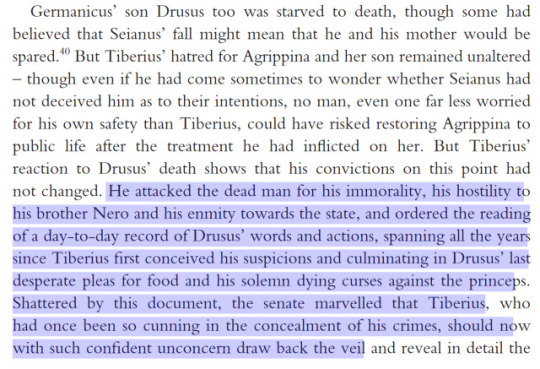
Tiberius, Robin Seager
the Drusus discussed here is Caligula's brother!
like! goddamn! and Caligula has to live on an island with the guy who made all this happen! Ancient sources say he learned deceit on Capri, but honestly what he probably learned was survival. Caligula didn't speak out in defense of his mother or his brother, and it's probably what kept him alive.
Generally, first half of his reign wasn't that bad, and it honestly could have gone a lot worse. Discussing the details of his reign with nuance (because I’m not interested in defending his actions uncritically lmao) would fill up a whole book, and people who are actually academics and historians have already done that better than I ever could
Interestingly, he rolled back some of the censorship on texts

Suetonius
That’s thee Cremutius ‘Surely I am not making speeches to incite the people to civil war, as though Brutus and Cassius were armed and on the fields at Philippi? Or is it not the case that they, despite being dead for seventy years, exercise through literature a hold over a part of our memory, in the same way that they are known to us through their statues, which not even the victor abolished? Future generations give everyone their due honor; nor will there be lacking, even if I am condemned, people who will remember Cassius, Brutus – and even myself." Then he walked out of the Senate and starved himself to death. The Senate decreed that the aediles should burn his books. But they survived, hidden and then republished. For this reason one is more inclined to laugh at the foolishness of those who imagine that today’s regime can extinguish the subsequent generation’s memory,’ Cordus!!
The incest allegations have been discoursed since forever, so I’ll skip it because that would have to be it’s own post, but what HASN’T been discoursed to death is whatever the hell was going on with Marcus Lepidus

Suetonius says they fucked, and goes on to mention a few other names: “He respected neither his own chastity nor that of anyone else. He is said to have had unnatural relations with Marcus Lepidus, the pantomimic actor Mnester, and certain hostages. Valerius Catullus, a young man of a consular family, publicly proclaimed that he had violated the emperor and worn himself out in commerce with him.”
and he made fashion Choices

and was a theater enthusiast, threw wicked* parties and spectacles, and generally didn’t give much of a fuck about other people’s opinions, much to the frustration of the Senate. as time went on, he’d become paranoid and start removing people close to him who could be a threat to power and life. which? fair enough, given the first twenty years of his life, but also: yikes, because there goes macro, and you can probably draw some kind of line between caligula’s deteriorating behavior to drusilla’s death and macro’s suicide happening within the same year.
(bonus round: caligula and the praetorian guard set up a recurring conspiracy theme that’ll haunt later emperors and their guards, but caligula did it first, baby!)
*wicked as in the classic Massachusetts modifier, but honestly however you want to interpret that is fine
Any text that doesn’t have a specific citation is from Dr Geoff W Adams’ The Roman Emperor Gaius ‘Caligula’ and his Hellenistic Aspirations!
#ta da! caligula fun facts!#for a guy who only lived to 28 he sure did a lot of things#hopefully these were fun or interesting! i am fully aware that things i think are extremely fascinating may be extremely dry for other peopl#so i tried to keep it focused on things that aren't like. his tax policies.#long post#ask tag#rec tag
54 notes
·
View notes
Text
Thank you so much @angelcloves for tagging me in this writing game!
1. What motivates you to write?
I’m plagued by visions that won’t leave me alone until I get them out somehow 😣
2. A line/short snippet of your writing that you are most proud of; if not, share a line from someone else's work that you love (just make sure to give credit
I don’t think I have a favorite line in particular, but I have always liked how I wrote Katya’s recruitment into the BATs scene:
Katya blinked at the group in front of her, trying to process what she had just heard. “You guys want me to join your gang?” she asked incredulously.
“It's not a gang!” Amber scoffed.
“It's a revolution,” Derwin explained.
“We're here to help people,” Raine added.
Katya still stared at the trio. The idea of helping others for the sake of helping was foreign to her. Her whole life she'd never known anyone to help a stranger while expecting nothing in return—well, that was until she met the human. Her question to her echoed in her head.
Why are you helping us?
Because us weirdos have to stick together!
She thought over what they had said to her. Katya sincerely loved bard magic, but she'd be lying if she said she never missed practicing other types of magic as she had done as a child. She still remembered how she'd nearly cried the first time she tried to magically grow a vegetable garden before realizing she couldn't. She also thought about the two times she'd been arrested, and about her neighboring cell mates.
Us weirdos have to stick together! And NOBODY should be punished for who they are!
Eyeballs Georg wasn't hurting anybody by eating his own eyeballs, and even though Tiny Nose’s theories were strange, she wasn't harming anyone either. Why should the Emperor, let alone the Titan, care about a couple of obscure demons? Why should the Titan care if she practiced the ancient art of fan fiction!? Why should anyone care!? The BATs were right, the system was unfair.
“I'm in.”
3. Which OC makes you smile when you think/talk about them and what are they like?
I don’t really make OCs unless I absolutely have to, not really my thing 😅
4. 4. Which process of writing do you enjoy the most?
I enjoy planning + writing the dialogue the most
5. Which part of writing do you think you're best at? (Stroke your own ego, it's okay)
I just said I enjoyed dialogue lol but I do think I’m pretty good at it! Sometimes I’m funny :P
6. What is something in the writeblr community that is most enjoyable?
Like Charlotte I’m also just treating writeblr as my mutuals but I would say when hype one another up on our writing 💪
7. A writing tool/device that helps you with writing (i.e. text-to-speech, a program, etc...)
I always make outlines. Always.
8. A piece of world-building that you like in your own story (it could be the magic system, a particular place, a law, etc...)
A fun snack/street food I came up with for the Boiling Isles, furnasi horn, which are cooked in the boiling sea (inspired by a real life place that uses hot springs to cook certain foods!)
9. What piece of advice would you give to encourage others to write if they are having a rough patch?
If we’re talking short term issues like you aren’t sure how to make this plot point work, I say take a break. Go outside, take a walk, have a snack, etc. Coming back to it if with fresh eyes usually helps.
10. Tag some people whose work you love/ have been your biggest supporters
Tagging @mistyfoxxy @woorenergy @disco-girl @animationadventures + anyone else who wants to!
5 notes
·
View notes
Text
Chapter 10 Part 7: Ma~!
After saving Duessel, Ephraim finally has a chance to talk to him about what's happening in the empire. Duessel relates how the emperor has changed suddenly.
"The emperor used to wish for peace and prosperity, not only in Grado, but in every country."
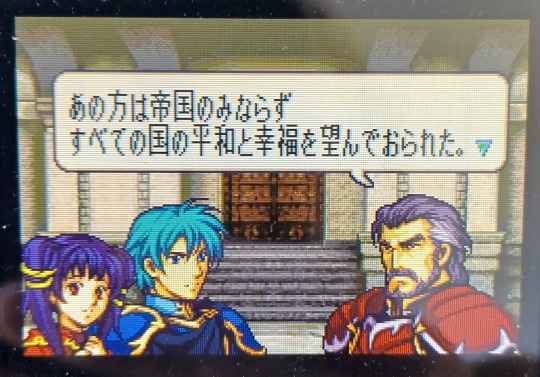
"Then...one day...he changed..."
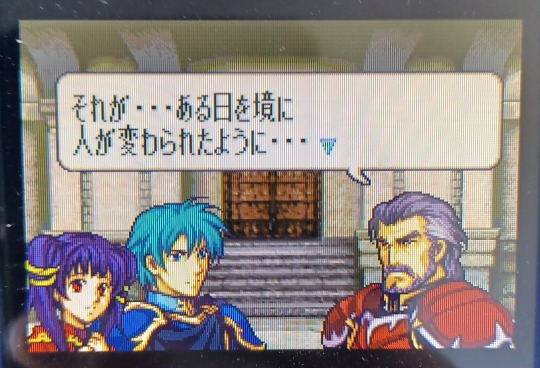
Ephraim asks what had happened around the time the emperor changed. Duessel mentions that he remembers hearing that Lyon and some dark mages had finished up some research, and had created a magic stone.
Duessel admits that magic is not his forte, so he doesn't know many details about what this magic stone was.
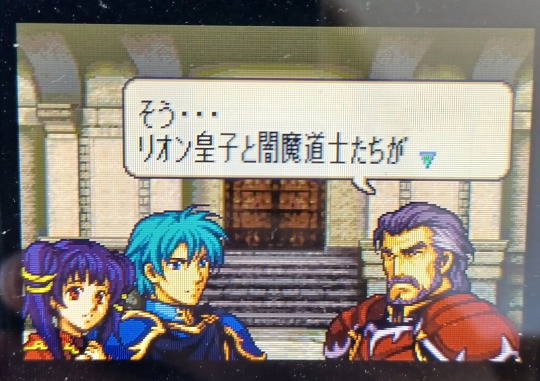
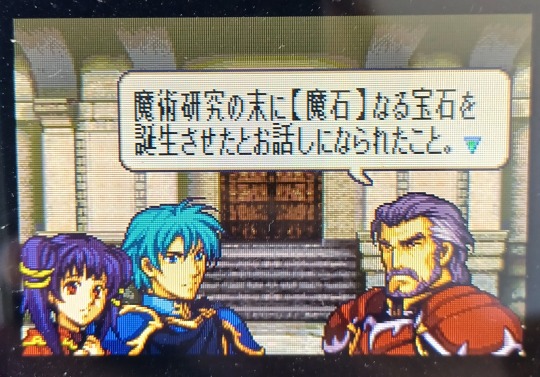
Myrrh confirms that the foreboding force she has been sensing from Grado feels to her like a power that "swallows people's hearts and changes them into different people".
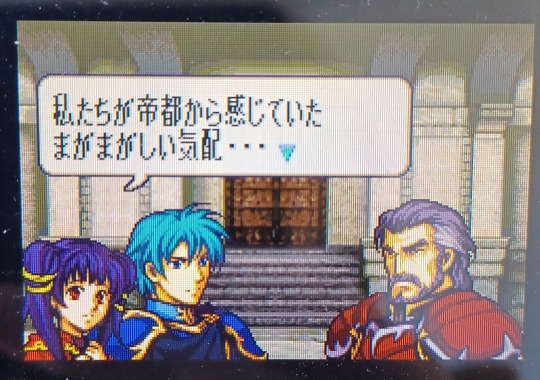
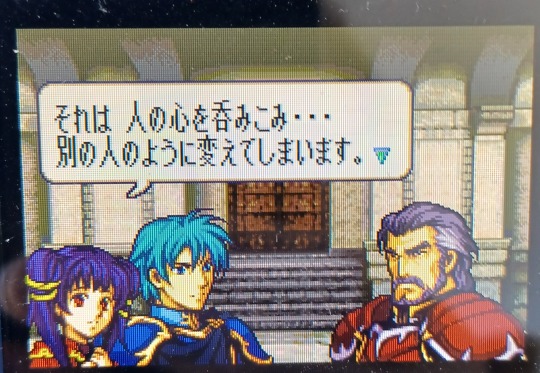
So Ephraim guesses that the change in the emperor must be due to the strange power that Myrrh is talking about. He also asks Duessel about where the stone is. Duessel replies that Lyon has it.
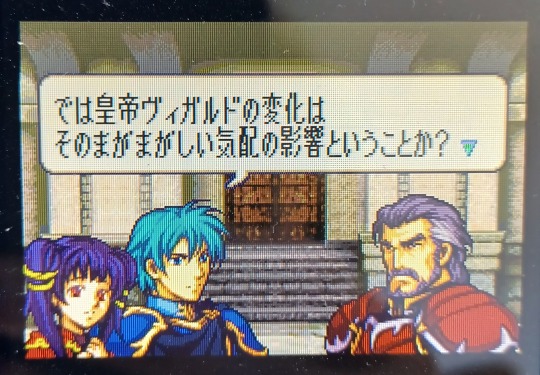
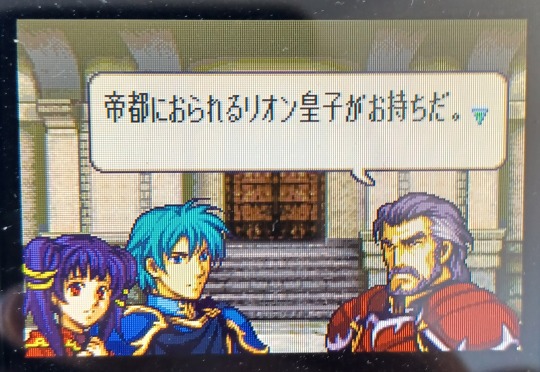
In some good news though, since we saved all of Duessel's allies, one of them presents us with a Knight's Crest as thanks, and advises us to use it for someone with "outstanding growths / development".
So...Franz? Yeah, definitely Franz.
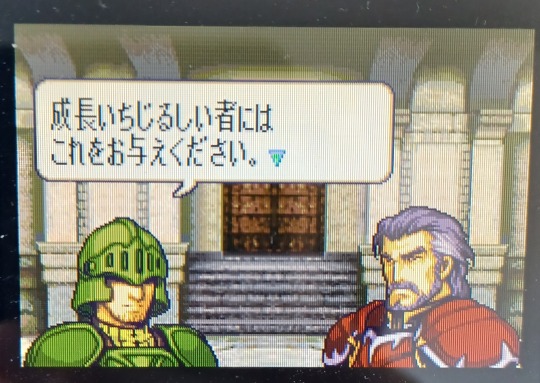
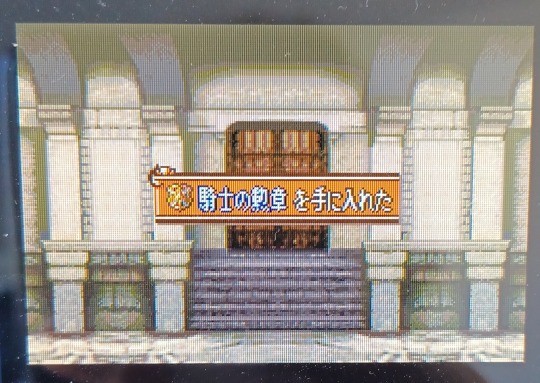
And now this woman shows up again!
We know she's a right and proper lady, because she expresses her surprise with the word "Ma!" (Also acceptable: "Arama!")
This is the same woman whom Eirika met back in the chapter where Artur and Lute joined.
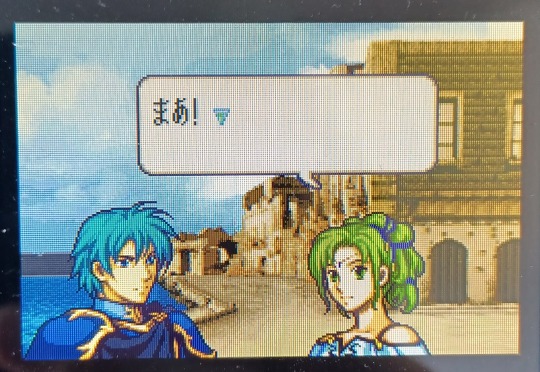
She guesses that Ephraim and company are about to head to sea.
Again, we know that she's a right and proper lady because she appends "no" to the end of "desu" in her question, and asks about Ephraim's "otsumori" (intention) with the "o" appended to the front of the word as a softener.
I always think it's kind of funny how Japanese has this whole vocabulary of language that signifies that someone is a highborn, proper lady, but I've literally never heard anyone speak this way in real life, only in media like this game. (I mean, I may just be moving in the wrong circles I suppose.)
Does English have anything like this? The thing that strikes me as most similar in American media is the way usually fancy (or evil (or fancy and evil)) people in American movies and TV typically have some sort of "upper classish" English accent.
But even though I think these two examples are very similar in terms of their usage in media, the example I'm giving for English is really all about accent, whereas the Japanese "Ojousama" is identifiable by her word usage, such that it's immediately obvious even in a text-based game like this.
Also, with the English example I thought of, my intuition is to say that it is not gendered at all, whereas with the Japanese example, a fancy-sounding male character in Japanese media would not talk the way the woman here is. The "ojousama" speech is specific to fancy ladies.
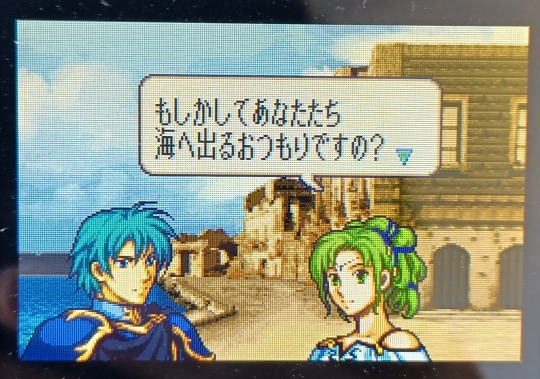
The woman warns Ephraim that he shouldn't go to sea now, and when he asks about the problem, she tells him that there are monsters attacking people from a ghost ship.
(Left photo: Note the "wa" after the "desu"! More ojousamaing.)
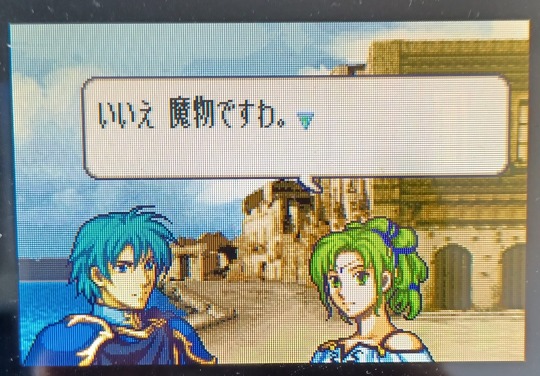
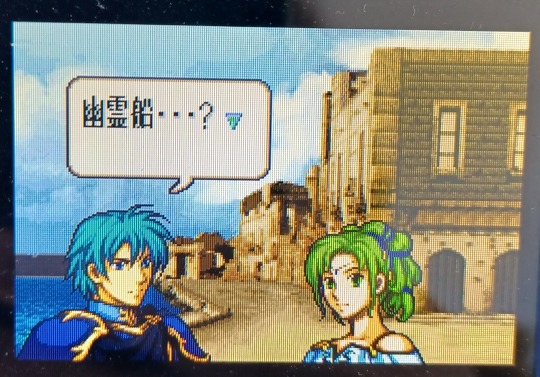
She then declares that she will banish the ghost ship!
(Basically, if you want to hear what she almost certainly sounds like, go play Three Houses with Japanese voices on and talk to Constance underground. But make sure to play this song while you do so: https://www.youtube.com/watch?v=x-6spbXBiH0
Or you can combine the above video with this one: https://www.youtube.com/watch?v=FUGLzS7Bc0s)
Ephraim has the same reaction to this random woman walking up to him and declaring that she will banish monsters that Eirika had multiple chapters back:
"What in the world was that all about?"
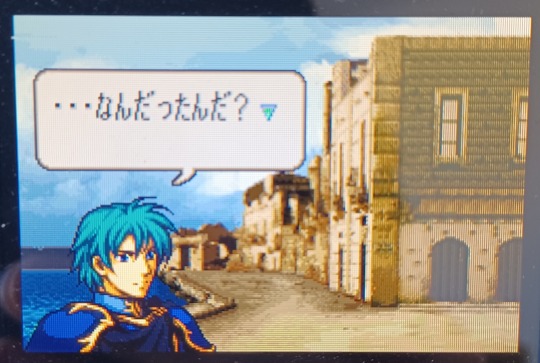
So of course, he utterly ignores her warning and immediately gets on a boat that arrives at port for him.
Next time: Fishing mini-game???? I hope!!!!
#fire emblem#sacred stones#fire emblem the sacred stones#fe8#ファイアエンブレム#聖魔の光石#l'arachel#duessel#あらま〜#japanese language#ojousama#お嬢さま
0 notes
Text
I don’t necessarily agree with her final statements re: the future of the war, but as always Masha Gessen certainly has relevant stuff to say about the current situation, and the how Putin works (here for the full transcription) :
EZRA KLEIN: Let’s talk then about the way (Putin) sees the world. And I’m trying to think of where to begin this, but I actually want to begin with the question of time. What time period is he mentally and metaphorically grounded in? And by that I mean right now in the U.S., I think the metaphor and the time period governing a lot of thinking is the Cold War. I think a lot of people are reaching back either to a remembered past then or to a studiable past, then. But I don’t get the sense from reading Putin’s speeches that that’s really true for him. I think that it seems that his periods are different. So what time period is he using as his metaphorical and conceptual base?
MASHA GESSEN: That’s a great question. But actually, first, I would say that Russians, in general, I think are much less likely to see the Cold War as a distinct period in history. The Cold War was, perhaps from the Russian point of view, is specific — a particular example of the post-World War II period, which is characterized by the Soviet Union becoming a superpower.
But Putin appears to be placing himself on a continuum of Russian history that he sees as a series of great leaders beginning with Ivan the Terrible. Ivan the Terrible was not an emperor that Russians particularly revered ever before Vladimir Putin’s reign. But the first monument to Ivan the Terrible went up, I guess, six or seven years ago in Russia. So Ivan the Terrible, Peter the Great, Joseph Stalin, and Vladimir Putin. It’s a huge span. It’s a series of great, brutal, expansionist dictators.
He skips right over the great divide of the October Revolution. He doesn’t see the Soviet period as distinct in Russian history. And so he gave a scary and rambling and ridiculous speech on February 21 by way of introducing this new invasion of Ukraine. But as a Putin text, it was quite remarkable because he laid out his vision of the entire Soviet period in more detail than he ever has before.
And what he said was that — without using the word empire — but he said that that whole Soviet way of constituting the empire by nominally giving its constituent parts the rights of statehood and nominally making the union voluntary was a fiction. That, in fact, there is a continuous history from the Russian Empire to the present day and that all the separations from Moscow’s rule that have occurred over the period of the last 100-plus years are illegitimate.
So he places himself in this really, really long period. But he also — I mean, he’s profoundly anti-modern. He’s engaging in completely uncritical, unexamined, imperial rhetoric and sort of saying everything that came after is bullshit.
EZRA KLEIN: Yeah, that is exactly what I’m getting at. And I want to talk about that speech in some detail. But what has been striking reading him — listening is the wrong word because I need to read the translations — but there’s been a tendency to call him irrational and unhinged.
And I’m not here to make any judgments on Vladimir Putin’s mental state. But what he seems to me mostly is somebody who has decided to act and think as if it’s 1847 and that his logic works better and is more comprehensible under the rules of imperialism and great power expansion and so on that were taken more or less for granted then. There were things you had to justify and things you didn’t. And it all makes some sense.
And he’s also throwing back to the 19th century, the early 20th century for the legitimacy of what he thinks Russia owns or what he thinks has always been Russian. But that there is something in him right now that has become, I think, confusing to a lot of onlookers because he simply refuses to accept the logic and norms of the international order that at least a lot of other countries believe they need to pretend to be following.
And I think it is a fair thing to say America does not actually follow these rules, this order, but it tries to pretend to. But he doesn’t. He just sort of brushes it aside more or less and has really thrown back to pre-modern logic of how a ruler should act and what is right and reasonable for a ruler to do.
MASHA GESSEN: That’s exactly right. And, you know, I’m glad you actually mentioned this idea that Putin is unhinged and irrational because I don’t think it’s ever particularly useful to call somebody — a world leader or anyone else — irrational. But it’s much more useful to try to figure out in what world they’re rational. Putin is perfectly consistent in his thinking and his behavior. It’s just that the universe he lives in is what he describes quite openly — we just have to listen — and it is the pre-modern, or if you do take into account that it is 2022, the anti-modern, universe of imperial logic.
And he looks at the West — and I think thinks that the West is irrational. He’s as aware — probably more aware than you and I are — of the hypocrisy of the norms proclaimed by the United States. But they seem totally absurd to him because they also don’t make sense, right? So here’s the United States that pretends to hold to ideas and values that make no sense, whereas he, Putin, has ideas and values that are rooted in history and he acts in perfect accordance with them.
(...)
EZRA KLEIN: So let’s talk about some of the things he says he believes. And I want to pull together a couple of statements he makes in his February speech about Ukraine. So he says, quote, “I would like to emphasize again that Ukraine is not just a neighboring country for us. It is an inalienable part of our own history, culture, and spiritual space.” End quote. He says that, quote, “Modern Ukraine was entirely created by Russia, or, to be more precise, by Bolshevik communist Russia.” End quote.
But then he says something weird. I mean, these are all weird things to say, but something that I thought was particularly telling. And after having given this long exegesis on the way that he understands Ukraine to have been a political construct by Lenin, he says, quote, “Personally, I can add that no political factors, however impressive or profitable they may seem at any given moment, can or may be used as the fundamental principles of statehood.” What do you take him to mean by that? What is he saying about what makes a state?
MASHA GESSEN: Right. So I mean, I think he’s doing a lot of things in that sentence. But mostly, he is devaluing speech, and devaluing politics, and devaluing legal arrangements. He’s creating a kind of image of a natural, possibly even a mystical, state, right? There’s a thing that is and he knows what that thing is. That thing is some sort of unity of Russians and Ukrainians. And in fact, when he says unity, he means the nonexistence of Ukrainians. It’s just Russians.
And we have piled a lot of things on top of that. We have piled a lot of language. We have created laws. We have drawn borders. We have elected parliaments, and said things about what one country is called and what the other country is called and having bilateral relations, or whatever it is we’ve done. But none of that matters because he knows what is. And what is isn’t any of the things that we have named or drawn or put down on paper.
EZRA KLEIN: There’s a theme throughout the entire speech in which Putin is criticizing the Soviet Union, criticizing the Communist period, keeps occasionally trying to say I understand things were complicated but certainly rooting the divisions he is trying to rectify through force now and decisions made by Soviet leaders. But then he says this — and he’s aiming this at the government in Ukraine.
He says, quote, “You want de-communization? Very well. This suits us just fine. But why stop halfway? We are ready to show what real de-communization would mean for Ukraine.” And on some level, that is simply framed as a threat of invasion, which he, of course, follows through on. But what does he mean by de-communization here?
MASHA GESSEN: Let me just preface this with something that I was just thinking as you were asking this question that I think we should be aware as we talk through interpreting his speech, which is one of my favorite, if depressing activities. One of the reasons that it’s so rewarding to listen to what Putin says is that he’s not a terribly knowledgeable man.
So when he gave that speech, it was very informative because I thought, oh, he has gone and studied these couple of things. He doesn’t know a lot of the context. He doesn’t have a lot of knowledge of history even though he fancies himself a historian these days.
But we learn a lot from the little that he says because he kind of says everything that he knows. And he delivers his idée fixe. And he gives a very clear reflection of what he is thinking about, what he’s obsessed with, and what he is going to be obsessed with for the foreseeable future, and what is going to be the motivating force behind his actions.
So clearly he has been thinking a lot about the difference between the Russian Empire and the Soviet Union. And he has decided that the Russian Empire was the legitimate entity in the Soviet Union was fake. And when he said that Lenin created Ukraine, what he is saying is that, you know, Russian Empire was a unitary power.
It’s not exactly true. There were actually significant exceptions to that sort of utilitarianism, like, for example, Finland, which, as part of the Russian Empire, had its own currency. It had its own parliament. But he may not know this. He thinks it was a single state with a single ruler and no meaningful borders.
And then Lenin comes along, takes this empire, chops it up into a bunch of pieces and says each of these is a state. Kind of like — and I think Putin is thinking this — kind of like the European Union is now. That’s a whole bunch of different countries that are in a voluntary union. The treaties on which the European Union is based are not dissimilar in substance from the Constitution of the Soviet Union, which gave each of its 15 constituent republics full rights of statehood.
And so he says all of that was completely false. It was a violence done to a country that existed. And so we illegitimize that. We go back to the empire. But when he’s saying, do you want de-communization, he’s also referring to something that Russia perceived as deeply offensive and even traitorous in the aftermath of the Revolution of Dignity in Ukraine in 2014, which is what in Ukrainian and Russian was called “Leninopad,” which translates as, I guess, the falling of the Lenins.
Ukrainians all over the country dismantled the Lenin monuments. To Ukrainians, this meant a break with the Moscow hegemony. To them, Lenin monuments in every central square, in every big city and small town, were a symbol of the Empire.
And so now Putin comes and says, OK, you dismantled the Lenin monuments to symbolize you break with the Empire. But hey, the only claim you ever had to statehood was thanks to Lenin who created this whole framework of Ukrainian statehood that I have now decreed is false. So if you dismantle the monument of the one guy in power in Russia who ever recognized your statehood, well, great, you don’t get to have any statehood.
EZRA KLEIN: Let me do two more here. The back half of the speech is very much about Russia’s relationship with the US, with Europe, with NATO. There is a long list of grievances offered of a narrative of an endlessly reasonable Russia making endlessly reasonable offers being rebuffed, ignored, dismissed, humiliated, talked down to.
At some point, Putin says, in asking why Russia keeps being treated as an enemy as opposed to a friend or an ally, quote, “There can be only one answer. This is not about our political regime or anything like that. They just do not need a big and independent country like Russia around. This is the answer to all questions. This is the source of America’s traditional policy towards Russia. Hence, the attitude to all our security proposals.” Is this how Putin sees America and the West, that we operate out of a constant and ongoing fear of Russian strength?
MASHA GESSEN: I don’t actually think that particular sentence says that the United States operates out of ongoing fear of Russian strength. I think it says that the United States continues to insist on denying Russian strength and trying to humiliate Russia and diminish it.
And there’s a specific reference point to this feeling and this narrative, which Putin has mentioned in other speeches, but which also is an integral part of the sort of distilled propaganda that’s going into, for example, into schools or is being distributed to bloggers and TikTokers that government agents are hiring to spread propaganda to the non-T.V. watching public, which is the 1999 air war in Kosovo, which to Putin is kind of the focal point of Russian humiliation.
Now, what happened in 1999 was that the United States decided to intervene militarily in Kosovo where there was a pattern of sustained ethnic violence perpetrated by Serbian police and military against ethnic Albanians. Kosovo was an ethnically Albanian province of Serbia that had strong linguistic and cultural ties to neighboring Albania and really wanted to secede from Serbia and join greater Albania. I’m going into some detail because Putin has gone to a lot of trouble to create a perfect symmetry with Ukraine.
In 1999, the United States decided to lead an air war over Kosovo without seeking the agreement of the U.N. Security Council and without consultation with Russia, or worse, explicitly rejecting the possibility that it would consult with Russia on a thing like this. Russia has only an imaginary connection to Serbia because Serbia is also an Eastern Orthodox country. There weren’t particularly strong economic or cultural ties.
But it was an incredible experience of humiliation and powerlessness for Russian leadership and I think for a lot of ordinary Russians. That idea that we wouldn’t even be consulted. That they wouldn’t even pretend to listen to us. The then Russian Prime Minister Yevgeny Primakov was actually on his way to Washington for talks with Al Gore about the Russian debt when he found out that the United States was refusing to even discuss the planned bombing campaign with Russia. And so he turned his plane around, returned to Moscow, and that was kind of a breaking point in Russian politics.
And so Putin is referring to that. He’s saying, look, they don’t take us into account. They wrote us off way back then in 1999. We have now come back. We’re economically and militarily strong. And we’re going to make it clear that we’re not going to be in that place again. We’re not going to be humiliated like that and diminished like that again.
EZRA KLEIN: Let me do one more of these. This is from Putin’s book, “First Person.” It’s a book of self-presentation, I think it’s fair to say. And he says there something that struck me as relevant, which is, quote, “I think that there are always a lot of mistakes made in war. That’s inevitable. But when you are fighting, if you keep thinking that everybody around you is making mistakes, you’ll never win. You have to take a pragmatic attitude and you have to keep thinking of victory.”
You’ve talked a bit before about the pains Putin goes to in this early book, in this early self-presentation, to explain what kind of fighter he is, what his relationship towards fighting is, and how he acts within fights. How do you read that quote and the sort of broader self-conception he has of himself in these moments?
MASHA GESSEN: That’s so interesting. I don’t remember that phrase. So this book was written in January, February 2000 during the second war that Russia waged in Chechnya. That’s clearly his main preoccupation at the time when he’s talking about war and his main reference point. And this, you know, is something I’ve been thinking a lot about in the last week and a half as Russia has become bogged down in Ukraine, and it’s made me very scared of what comes next.
Because what happened when Russia started a war in one of its own breakaway provinces in Chechnya was eerily similar to what is happening in Ukraine. Yeltsin at the time was promised — in 1994 — he was promised a quick two-hour quick war where they would overthrow the elected government of Chechnya, install a puppet Moscow government, would be welcomed with open arms, and solve the whole Chechen separatists crisis.
It turned out that their coup design failed miserably. And then their attempts to take Grozny with tanks and infantry failed miserably. And then they bombed the life out of Grozny. They carpet bombed Grozny, the capitol of Chechnya. And still they were confronted with popular resistance and guerrilla warfare for months and months and months until, in 1996, they finally settled on basically a cease fire that lasted for about four years until Putin came around and said, no, we have to finish the job.
And finishing the job was basically a scorched Earth approach to both Chechnya and Russian politics, right? There was not going to be any opposition tolerated to the war. And there was not going to be any independent media coverage tolerated of the war.
And what we’ve seen over the last week and a half in Ukraine is they planned a coup. The coup clearly failed miserably. Their first attempts to get paratroopers into the country to just have some kind of quick military operation and their designs on the Ukrainian public greeting them with open arms all turned out to be completely deluded and fantastical. And so then they tried to take half the country at least with tanks and infantry. Also doesn’t go so well. And I think we know what comes next.
EZRA KLEIN: I think then, before we do books, I want to end on something you said that relates to what comes next. This was in a recent interview you gave. And you said, quote, “Putin has staked his entire political future on this war. There’s no way for him to exit it, to find a non-triumphant solution and retain power, and I don’t think there’s a way for him to survive not retaining power — to humanly physically survive not retaining power. He is really cornered. And that’s a terrifying situation for the world, not just for Ukraine.”
Rather than exactly having you expand on that, I want to ask what your — to the extent there is such a thing as an optimistic scenario here — and that requires a time machine, so optimistic may be the wrong word. But what is the least worst outcome you think realistic right now?
MASHA GESSEN: You know, Ezra, I don’t actually know. I mean, least worst in the short-term is still pretty awful. But it’s pretty clear he takes Ukraine up to say Kyiv. He imprisons or more likely kills Volodymyr Zelensky. The West sort of negotiates a cessation of the war in exchange for letting him take most of Ukraine. And then the optimistic part — I mean, that’s the best case scenario in the short-term because at least the killing stops — and then the optimistic part is he dies soon after. Because if he doesn’t, it happens again and again and again.
EZRA KLEIN: And you mean here in places like Moldova?
MASHA GESSEN: Moldova, Ukraine, Georgia, the Baltics, Poland — they’re all on notice.
EZRA KLEIN: Well, that’s a chilling answer.
MASHA GESSEN: That’s the best case scenario. In the worst case — I mean, the worst likely case I think is we’re talking about a tactical nuclear weapon aimed at military airports in Poland.
EZRA KLEIN: So there is, for you, no climb down here for him. There’s no version where he takes a face-saving compromise as opposed to an actual territorial victory that is a real enough victory that he understands it to be a victory that he can build on in the future?
MASHA GESSEN: I haven’t conjured one. If someone else does, I will clutch onto it for dear life, because what I’m looking at is absolutely terrifying.
EZRA KLEIN: I’ll leave it there then. Always our final question — what are three books in this moment that you think people should read?
MASHA GESSEN: So I was actually thinking of three of the best books about Ukraine. Well, actually one is about the breakup of the Soviet Union, which I think is very accessible and very useful to read right now. It’s Serhii Plokhy. He is a Ukrainian historian at Harvard. “The Last Empire.”
It’s a fairly short history of the dissolution of the Soviet Union from a post-colonial perspective. There are different ways to think about what broke the Soviet Union apart. But this takes, as a starting point, the idea that this was a century when empires collapsed and this was the last one to collapse.
I would also recommend Kate Brown’s “Manual for Survival,” which is a book about Chernobyl. There was a small explosion of — explosion is a bad word — but there was a few books that came out about Chernobyl a couple of years ago. And this is my favorite because it’s a history from below.
Kate Brown talks to a number of people, many of them women, which is something that other historians of Chernobyl didn’t do. They very much looked at it as a history from the top. And I think it’s an extraordinary book about not just what happened in Chernobyl but about how a totalitarian society worked.
And there’s an amazing book called “Babi Yar” by Anatoly Kuznetsov, who was a little boy in Kyiv in 1941 when the massacre at Babi Yar, on the outskirts of Kyiv, where tens of thousands of Jews and later tens of thousands of people of other ethnicities were murdered by the Nazis. So it’s a kind of meta-read where you learn about Babi Yar, but you also learn the bizarre ways in which Soviet censorship and Soviet repression of history worked.
#imperialism#masha gessen#nationalism#you can only believe in russia#russian politics#come you masters of war#keep wondering why the reference to chechnya doesn't come over more often in the discussion re: future of the war#oh well. i actually know very well why.#it's just that ppl in Europe have long construed aleppo and grozny as /not us/ spaces that don't truly matter
40 notes
·
View notes
Text
there’s a common idea in fanwork spaces that the sort of works you get in a fandom are the ones that the original series is lacking, or that fans really wanted to see, and while I think that a lot of fanworks DO come from that desire, I don’t think it’s universally true.
As an example of what I mean, let me give two points: The homestuck fandom as a whole, and the fandom of Warhammer 40k.
Homestuck fanworks are very much in the same vein as the original series; they’re very talky, character-driven works that tend to focus on relationship dynamic. Perhaps to a greater degree than canon, but canon DID delve into these more often then not. Homestuck as a Thing wandered around so much that its probably fair to say that pretty much anything you could suggest as a story is in there SOMEWHERE. It may even be more likely to point out that since HS does a lot of timeskips or compression of character development that potential fanworks involve wedging itself in at a good point that is rife for analysis or exploration, and cranking it open.
Warhammer 40k, conversely, is a tabletop war game. The setting is based around this; everyone is SOME variety of terrible, deliberately malicious or unbelievably short-sighted to justify why any given faction or internal group would have a fight against each other. The lore and fiction works around this, though it is notable that any fiction set within 40k has ALWAYS toned down the grimdark attitudes, precisely because while that works as a broad attitude in lore for a war game, it makes less sense for a place where people actually live and do things.
40k fandom has mostly just dwelled on the battles; either making stories center around conflicts and singular epic battles, or using those as a story. Certain fanfics of legend have gone past their scope (such as that one love story between an Eldar Farseer and a Krieg trooper). Let us take, for instance, If The Emperor Had A Text-To-Speech Device, a long running fan animation that is believed to have retroactively influenced the game and lore. (For one thing, its responsible for a lot of people remembering who the Custodes WERE for a while, and also filling all the lore videos with meme jokes about the Pillar Men.)
The thing is, this series fills in the cracks of lore and expands on them, giving them more character, and mingling modern 40k elements with the older, often very wacky or downright silly lore. (I still contend that the Emperor, as a character, makes way more sense if you go with the older idea that he literally excised his capacity for compassion.) The characters get more depth, it treats the setting with a much more comedic tone that many parts of fandom liked MORE than the relentless gritty tone of taking itself too seriously...
And there’s also one or two big battles that were actually played out in real life, using the war game rules, complete with disastrous out of nowhere failures, such as memetically overpowered character Kaldor Draigo repeatedly doing very little of consequence in the battle because he kept failing his dice rolls so badly they made him go BACKWARDS at one point. (His complaints about this are also probably the most sensible things he says in all his screen time.)
So I think the result of this is that fan work may generally be less about fulfilling what wasn’t present in the original series, and more about expanding on things. The difference may be minor in some cases, or outright the same thing. However, just a HINT of something is enough to get fanfic writers on that, so that’s where you usually see this sort of thing. Homestuck and 40k, as two VERY broad sources with a lot of room to play around it, are great examples of this.
Other long running series, such as Transformers, may offer bigger examples of this.
15 notes
·
View notes
Note
Everytime I read "Nicolo di Genova" my brain glitches and I read "Nicolo do Genovia" instead so /whispers/ Kaysanova Princess Diaries AU?
...yes. Did someone say Gay Champagne Romcom? Because that is my Brand.
Nicolò is an Italian-American graduate student living in New York City with his widowed Italian mother and working on an engineering degree at NYU. He was thinking about joining the priesthood for a few years and recently dropped out of seminary and is feeling that Millennial Crisis that all of us know about. He has gone on a few Tinder/Grindr dates, but it’s hard enough to meet someone in this city even when you’re not a gay ex-priest engineering student living in his mother’s rent-controlled apartment in Morningside Heights because have you seen the property prices in New York. Plus WHENEVER he brings a nice boy home, HEY PRESTO there’s his mom waiting eagerly up in the front room, “NICOLÒ WHO IS THIS HANDSOME YOUNG MAN, DOES HE HAVE GOOD PARENTS, IS HE A CATHOLIC NICOLÒ” and of course that instantly kills any kind of romantic mood. Nicolò is like “let’s just go over to yours PLEASE.” But he tends not to see his dates again anyway, and it’s equally depressing, and it’s nice that his mom isn’t homophobic or anything, but he’d like to just meet someone without his mother instantly planning the Big Fat Gay Italian Wedding, and yes he knows this is a nice problem to have but STILL
Anyway, then of course the Dead Dad Circus rolls into town, and Nicolò learns that he’s not actually the son of a nice hardworking Italian immigrant, but of His Serene Highness Prince Domenico Grimaldi of Genovia, who wouldn’t you know it, has recently died too young from cancer and left no legitimate heir except the result of his rebellious teen fling with a cocktail waitress in Capri – which would be, you guessed it, Nicolò. While Nicolò is still processing the horrifying mental image of his mother being a cocktail waitress in Capri and having to look up Genovia on a map, the rest of the royal machine is kicking into overdrive. This involves a very awkward meeting in a very fancy Manhattan hotel with Nicolò’s magnificent but rather out-of-touch royal grandmother, Her Serene Highness The Queen Mother Maria Elisabetta Henrietta Julia Victoria Mignonette Grimaldi of Genovia. She’s basically Julie Andrews because obviously. She informs Nicolò of his Solemn Duty to return to Genovia and become Prince Nicolò and eventually be prepared to take the throne and submit to a fascinating life of minor European royal family ribbon-cutting duties. Oh, and getting married and producing more heirs to the throne, on pain of breaking a thousand-year-old bloodline, though she doesn’t say this out loud. Her loyal right-hand man, driver, and general bodyguard/fixer/man about town, Sebastien le Livre aka Booker, gives Nicolò various sympathetic looks but does not interrupt.
Nicolò obviously freaks out and runs off to call up his best friend at NYU, Andy. Andy is some indeterminate degree of years older than him, in some indeterminable stage of her Classics PhD, and sometimes says weird things like how badly the Library of Alexandria had already been defunded by the Roman emperors before it finally burned, like she was there and holds a personal grudge about it. She is a cranky vodka-drinking lesbian who rides a motorcycle, gets them into periodic scrapes, and understands his shit dating life. She deeply empathizes with all his “I’m not going to run away and leave my life in New York to become part of some creakingly antique regressive imperial monarchic system of racist and homophobic oppression, NO SIR!” Fight the power, Nicolò. Fuck those guys.
Of course, however, Julie Andrews Grandmother Maria prevails and Nicolò is forced to take Prince Lessons, which he hates but tries to be a good sport about, because, well, he’s Nicolò and he’s a good person. He is then whisked off on a private plane to Genovia, because they want to see him in situ before they make a final decision on accepting him as their prince. There of course we have the high-life palaces and parks and snooty clueless aristocrats who look at Nicolò like he’s a prize racehorse and have absolutely zero clue, none, nada, about the real world. Just as Nicolò is about to firmly decide that this is a complete crock of shit and he’s going back to NYU, he meets….
Prince Yusuf “call me Joe” al-Kaysani.
Joe is a minor member of one of the Middle Eastern royal families, some fictional tiny Gulf kingdom that is super SUPER oil rich. He has a title and a lot of money but doesn’t have a clearly defined role in the family, other than that he’s been ordered not to embarrass it. Nicky does not know this when they first meet, but obviously it’s not possible to be an out gay prince in a conservative Arabian-peninsula Islamic kingdom, and therefore the fixers have arranged for Joe to be publicly dating a daughter of the Malaysian sultan, Quynh. (We are making her Malaysian in this instance so she can also be Muslim and hence an appropriate match for Joe.) Except Princess Quynh is also hella lesbian and is getting the same thing out of the fake dating with Joe that he is, i.e. throwing people off the scent of their real selves. They spend their time together in private eating popcorn, commiserating about their lives and crazy royal families and the press invading their privacy, watching romcoms, and Judging the Straights. They’re actually best friends and text each other all the time, so at the royal function where Joe runs into the stiff and nervous and clearly overcompensating New Guy who’s evidently the New Prince of Genovia, and oh my god Q he’s the Most stuck up person I’ve EVER MET, Quynh is the first to hear ALL about it. She immediately suspects that Joe doth protest too much.
Meanwhile, Nicky meets Nile Freeman, another young American (from Chicago, obvs) who is working at some important EU institution currently headquartered in Genovia. They also hit it off and Nile tells Nicky about the things she wants to do to help change the world and why she’s here, and he is moved by her kindness and altruism and remembers that that was what he wanted too, and why he joined the priesthood in the first place. He opens up to her about the shock of learning the truth about his now-dead dad and the crazy whirlwind he’s been sucked into and how he doesn’t know what to do, and their friendship is beautiful and we love it.
Meanwhile, of course, Nicky and Joe keep running into each other and getting on each other’s nerves, Nicky is thisclose to calling up Booker and ordering him to deport Joe because why is he always here (Booker, of course, will eventually become a secret ally in helping them see each other, but that is not quite yet). There is some Shenanigan where they end up both getting into trouble, Grandmother Julie Andrews is not amused, and finally they are forced to sit next to each other for a whole state dinner and Be Polite, because Genovia is trying to forge better relations with Joe’s kingdom. (Genovia is tiny, ancient, and broke, Joe’s kingdom has obviously a ton of money, there are old historical ties between them, some Genovians traveled to the kingdom in the past, Genovia’s trying to improve its human rights record and take in more refugees, etc. Nile is also helping with this last). So Nicky and Joe get ordered to fake a highly convincing bromance and pretend they’ve been best buddies all along (think Red White and Royal Blue) and that means they have to actually learn about each other and spend time together and ugh, he’s a spoiled rich playboy brat, and ugh, he’s a clueless American who thinks he’s better than us, and…
Oh no.
Yes, of course they fall in love, they deny it as hard as they can, Nile and Quynh and Booker are all increasingly exasperated by their attempts to pretend they’re not, and finally they kiss and make love and admit their feelings and that they want to be together. Then of course they get outed by some scheming evil cabinet minister (Merrick) who doesn’t want Nicky to become king and disapproves of him dating (gasp) a MUSLIM WHO IS ALSO A MAN, and there’s a huge scandal and a ton of drama and the usual Romcom Breakup Angst as they decide whether they can still see each other. Andy flies out to Genovia to comfort Nicky, Booker has a Word With The Queen, and Joe hides in his room until Quynh (along with Nile, who she’s met and hit it off with) appears to tell him that he has to be brave, she’ll help.
Anyway, etc etc., Drama, “I love him no matter what, if you don’t accept him you don’t accept me and your STUPID BLOODLINE CAN CHOKE” speeches from Nicky, Julie Andrews sees the light, they decide that Nicky and Joe can keep seeing each other, and it’s all rather sweet. There’s a lot of public relations to be managed and whether Joe’s family is going to disown him and what this will mean for the whole international relations thing, but… one thing at a time.
Nicky agrees to become Prince of Genovia as long as he can be with Joe, Joe decides that hey, he likes Nile too and there’s plenty of meaningful work to be had here and the three of them can join forces to do good things and he’s going to stay, and the Genovian public obviously comes around and loves them. Nobody can find Princess Quynh. It’s rumored she ran off to America with a cranky vodka-drinking PhD student of indeterminate age and was last seen on the back of a motorcycle heading west.
Everyone lives happily and gayly ever after.
The End.
271 notes
·
View notes
Text
About the 3E exam Lore post
The 3E exam sadly only appears once in the entire series of the novels and doesn’t really appear in the game as it is depicted in the novels. The purpose of the exam is to determine your dragon ‘resonance’. How much of a kinship do you feel with dragons is a measure of how much you can understand their minds, their writing and their culture. It makes you an asset in the study of dragons.
Those who don’t resonate well are pretty much useless to the college so that’s why if you don’t pass, you cannot gain entry in to the college.
Fingel explains it really well so I’ll just translate what he says:
"Anyway, the abbreviation for Ability Evaluation Exam is EEEI the correct spelling is Extraction Evaluation Exarn, which originally meant Bloodline Evaluation Exam. It is mainly used to identify the students' dragon blood lineage. Dragon blood descendants have a fairly obvious resonance for 'dragon language', and both the Dragon Emperor and the Dragon King have the ability to 'speak the language', that is, within his ability, what he says will become a rule that 'Language' is a tool for the dragons to use their abilities." Fingal rambled to explain to Lu Mingfei, "Some students have a good percentage of dragon blood, but inherited all the 'garbage genes' of the dragon race, the ability will be insufficient, so after the EEE will be downgraded, really unqualified will be ordered to withdraw from school."
In short: Just because you have a high percentage of dragonblood doesn’t mean you’ll score high on the test. You have to have the ‘right genes’, ones that will give you strong abilities to use ‘Yanling’ or dragon language. The language is key to their power, not their scales, wings or tails.
In the chapter Reunion: There’s several references to ‘voices’, ‘speaking’, ‘calling’, and ‘understanding’. That means that Tigre inherently and instinctively understands dragon speech and knows what it’s from. Just like when Toyama showed him the cards of the language of several people (Korean, Chinese, Japanese and English) and he could automatically read it, people who score high on the 3E exam don’t have to be taught dragon language, they can inherently and instinctively understand it.
Finger continues to explain
"Once the dragon blood ratio reaches a certain level, you’re not really human anymore. This bloodline will give you abilities beyond the ordinary, but it will also give you a great sense of alienation. Only contact between dragons and dragonkind can eliminate this sense of alienation. So the high purity of the dragon blood will make the descendants naturally gather together. This is genetically determined. The dragon race is relying on the 'blood of mourning', this ability to gather hybrids from around the world. Usually once the dragon blood descendants understand their identity, it will feel like the soul is awakening from the depths ...... "
In the chapter Reunion you see this when Tigre remembers when he when he looked into the eyes of Chu Zihang. Chu Zihang’s golden eyes can awaken the blood in hybrids and naturally cause them to submit to him briefly. That’s why when Tigre looked into Zihang’s eyes, he recognized him, not as food, but as a ‘brother’ someone who was kin with him. His eyes dispelled that sense of alienation. He didn’t know who Chu Zihang was. He just naturally recognized him because he has the genes that can do that. He also understands that he’s finally with his own kind in Reunion and it feels like he’s being called to ‘family’. The question ‘who am I’ that plagued him all his life is ‘blood mourning’ or ‘Blood Cry’.
"Master brother do you know how many lines of dragon text have been deciphered so far? There are only 76 sentences," Fingal said sagely, "The last person in history who knew the grammar of the Dragon was Nicholas Flamel, who
This Master Scribe is the only master alchemist in the historical record who made the 'Sage's Stone' because he bought a handwritten copy of alchemy when he was copying an old book, and what was recorded in that book, was the Dragon Text grammar. After he learned the secrets of the dragon language, he did not pass it on to others, but summarized 76 obscure incantations, which were passed down to us, and that is the number of dragon languages we can currently decipher.".
“The content of the examination is also this 76 sentences. The number of questions derived from the examination is also very limited, about 200 questions."
"The test is very simple, when you enter the examination room, they will only give you a blank sheet of paper and a pencil, will not give you any hints. But they will play a recording of the dragon text in a very low volume, and if you don't pay attention, you will think it is simply a mosquito humming. But for the dragon blood, these dragon incantations will resonate directly with their spirit and will seem unusually clear, you just have to follow the sound you hear and record it with Korean notes. There are 12 questions in total, those who answer 6 correctly pass, those who answer 8 correctly can directly take the advanced course, and those who answer 10 correctly are 'S' level students!"
"You're really of dragon blood, some hums are like thunder in your head, I used to be 'A' level, I just felt a deafening chanting sound in my head at that time."
In the Chapter Reunion, you saw this. Tigre heard the music and, even though the sound of the dragon voices was very low, the dragon voices soon became all he COULD hear. It was like a thunderous roaring or a chorus of voices. Until he stopped hearing the music completely and could only hear these voices.
"No matter what the other candidates do, you should not be distracted, but listen with all your might to a low water-like sound under the cover of the music, that is the dragon text incantation, for those who have resonance, that incantation will go directly into the depths of the mind, as if someone is speaking in the mind.”
Describing his own experience, Fingel said.
"It was as if a hole had opened in my brain and someone had poured in clear water from there, and space became like a myriad of silk threads that suddenly erupted out and pierced through time, and there was a woman crying at the end of time." Fingal said, "I don't know how, I felt very sad and sad all of a sudden, and I cried myself, so naturally I wrote the answer out."
Crying is a typical response. Tigre also burst into sorrow and tears but for him it was mixed with joy. He realized how lonely he was but also how happy he was at the same time and he couldn’t stop crying.
@a-chaotic-dumbass
@rurifangirl
@natsumi-yamiko
9 notes
·
View notes
Text
My Start to Warhammer 40K was Rough
So, an old buddy of mine got into Warhammer 40K while he was in college, and I finally agreed to give it a try. He introduced me to a lot of war, and I started watching “If the Emperor had a Text to Speech Device”. Well, we finally got back together to do a game IRL. (I kicked his ass.) He showed me his Tyranids and I commented on how they looked like the miniatures I had from a board game my family had when I was really young. (We had picked it up from the bargain box.) I didn’t remember the name of the game, but I remembered the box art. Well, we kept playing and said our goodbyes. Later that night we were talking over discord about 40K on Table Top Simulator, looking up add-ons we could use. Well, one of the search results came up and... It was the box art of the game I had growing up. Turns out that game was an old piece of 40K merchandise from 1992 called “Tyranid Attack”.
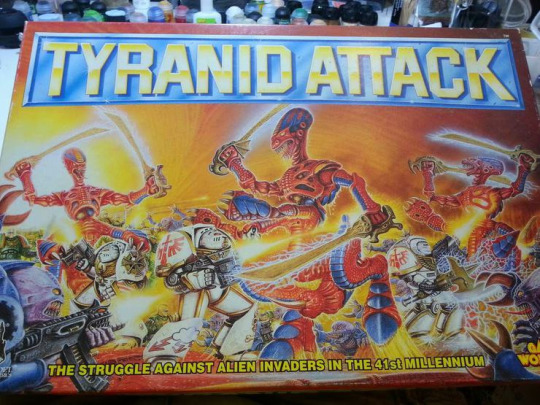
I’m certain my family sold it when we moved when I was younger. It had 31 miniatures. It would have been perfect for me to use... I’m still looking in our attic in the vain hope that we still have it, but I don’t think I’ll find it. I’m super upset too because I can only find two copies for sale online and..... Well, I’m fairly certain that this shit ain’t worth $600. I ordered some Orks for $30 because I loved their lore and using my friend’s Orks. So I’m getting into the game, but man, does the whole Tyranid Attack thing hurt me right in my heart.
3 notes
·
View notes
Text
Kitten x Reader headcannon
𝐻𝑜𝓌 𝒹𝒾𝒹 𝓎𝑜𝓊 𝓉𝓌𝑜 𝓂𝑒𝑒𝓉?
After long and stressful day at work you finally managed to got home
Today the higher ups from the business your working in decided to pay a visit to your department.
And it caused your boss to evolve from typical asshole to mega asshole.
The visit lasted the entire day and in the end they conclude that you are one of the best departments in here.
It was a pleasant way to end this day at work, so after they said goodbye, you packed your things and went home.
You putted your bag away went to your bedroom to change into more comfortable clothes
When that was done you made a nest on your bed and turn on your laptop to rewatch your favorite series, If The Emperor Had Text-To-Speech device.
First time you saw it was at your friend’s house
During one of your visits your friend showed you one of the episodes of the show, and it took only that for you to fell in love with it.
Now whenever you wanted to relax you just rewatched whole series.
It still makes you laugh no matter how many times you already watched it.
After a couple of episodes you started feeling rather tired and fell asleep.
You woke up a couple of hours later
Laptop was turned off and placed next to you
“Strange” you thought to yourself, you didn’t remember turning it off
Couple of minutes passed and very bright light appeared in your room and started sucking you into itself
Panicking you tried to hold onto something, but it didn’t help.
Now you were falling through this strange entity
The end of it was leading to some sort of room with tiles as floor
You closed your eyes preparing for impact but just before you hitted floor something slowed you down, but even slowed impact was hard enough to make you lose consciousness.
“Hello?” you heard male voice
You woke up and saw some sort of knight in golden armor kneeling next to you
He seemed familiar
Knight helped you stand up, and then you saw a giant skeleton sitting on some sort of throne
Wait it can’t be-
“WHO DARE TO INTERRUPT MY PRECIOUS COMPLAIN HOUR?!”
36 notes
·
View notes
Note
Hi, I dont know if you read or know anything about Macchiavelli's "Il principe", but I am studying it in school and I cant help but compare it's fundamentals to how Flint leads. I'm just curious about what you think
Eekekekekekekekekekekkek okay so first off Anon, you are absolutely, 100% right to be getting those vibes. If it’s not actually textual it is at the least meta-textual that Flint ascribes to a very Machiavellian type of leadership. His whole ‘never was there a Caesar who couldn't sing the tune’ speech is...licherally a direct reference to Machiavelli's philosophy that leaders cannot retain their leadership without sacrificing some level of ethical behavior in order to manipulate and deceive their subjects into following them.
And, Flint owns at least two books from thinkers who drew directly on Machiavellian thinking in their texts: De Jure Belli Ac Pacis by Hugo Grotus and The Leviathan by Thomas Hobbes are both visible in Flint’s cabin, and both drew heavily on the type of leadership principles established in books like Il Principe.
(Also, my eternal quest for the book that sits *under* The Leviathan in that scene remains. Y’all I will literally pay someone for this knowledge. My best guess is Plato’s De Republica.)
In fact, the whole system that Flint’s world was operating under at this time was very machiavellian in influence.
Henry VIII, who converted to Protestantism and who would eventually lead England in the conversion from Catholicism to Protestantism that would then in turn eventually lead the country into the War of Spanish Succession(the war being fought during the London 1705 flashbacks), was a student of Machiavellian thinking. He took the teachings of Il Principe to heart and used them to transform his country. Over the next hundred and fifty years, England would change from an entirely Catholic country to a Protestant one. Of note, Catholic scholars generally disagreed with Machiavelli’s principles on the grounds that it did not support the Divine Right of Kings.
As well, the Enlightenment thinkers that influenced Thomas Hamilton(and Flint himself) were starting to argue more for personal liberty and choice of the governed, both concepts presented in Machiavelli’s writings. (For those following along, this approach was also being used to justify slavery, as what was ‘good for the state is good for the man’ was used as justification for everything from impressment to colonization and slavery. Men were willing to set aside their morals for what they justified as good for the state. Shrug emoji.)
As James says of England when he and Thomas view the hanging in London:
“You think Whitehall wants piracy to flourish in the Bahamas?”
“No I don’t think they want it but I think they’re aware of the cost associated with trying to fight it. And I think that that sound travels.”
Here we see that Flint knows what Thomas doesn’t or does not want to accept: that England is willing to sacrifice some morality and some amount of lives(both of pirate-prisoners and the ships they take) in order to save themselves the financial burden of rooting out the causes of piracy. The justification for piracy was that it is too costly to fight, and that the nation ultimately benefits from a bit of strife as it drives prices up and allows England to place within the sights of its citizenry an identifiable enemy. (Note that Blackbeard also argues the same of Nassau, that prosperity ‘made it soft’.)
Even as he is changed by Thomas’ line of thinking, this lesson will stick with Flint and we’ll see it over and over again as he deals with the men’s hatred of himself by redirecting them towards other avenues(Vane, Hornigold, England, etc.)
And in actuality, this is what sets Thomas very much apart from his political brethren - he was *not* willing to sacrifice his morals in order to achieve a ‘more effective’ victory. Once he realizes that moral deficit shown by England, he creates the pardon plan to argue directly for a more moral and just way of governance. His whole premise for the pardons was to show England that an approach that considered the needs and wants of the governed was ultimately more effective, both in cost and in gaining the genuine good will of the people. And again, this is another likely reason why Thomas was then targeted by Peter Ashe and his father. Railing against the entire system of government was dangerous. Particularly if one was railing against the government in a way that could be seen as support of an opposing system of religion and political rule(remember how I said before that Catholics were generally against the Machiavellian systems?) Put plainly, Thomas’ rejection of Machiavelli’s leadership tactics would have been yet another argument for his treason against the crown.
Interestingly also, Marcus Aurelius - Thomas Hamilton’s homeboy - is said to be one of Machiavelli’s five “good” emperors, of whom Machiavelli wrote,
“[they] had no need of praetorian cohorts, or of countless legions to guard them, but were defended by their own good lives, the good-will of their subjects, and the attachment of the Senate.”
How we tryna be.
And so we see that Flint has - not so much fallen back into England’s line of thinking but perhaps that he never really fell out of it. And that this is actually a rift in his potential ability to conform to Thomas’ line of thinking, assuming we see that line as more morally correct. We do see Flint, gradually, throughout the course of the show, move more away from this Machiavellian line of thinking, especially once he meets Madi and the Maroons. And to me at least it’s one of the most important character shifts we see - in contrast to the trajectory of John Silver becoming Long John Silver - throughout the series. Just as Flint is finally starting to really value the lives of those around him, Silver has learned how effective those tactics can be in achieving his goals. As Hands says - ‘I wonder if he knows how much you learned from him.’
And in fact, Silver almost directly quotes Machiavelli at one point when he talks to Flint about their different leadership styles.
“I once thought that to lead men in this world, to be liked was just as good as being feared, and that may very well be true. But to be both liked and feared all at once, is an entirely different state of being in which, I believe, at this moment, I exist alone.”
Whereas Machiavelli in his chapters addressing cruelty and mercy writes
"Here a question arises: whether it is better to be loved than feared, or the reverse. The answer is, of course, that it would be best to be both loved and feared. But since the two rarely come together, anyone compelled to choose will find greater security in being feared than in being loved."
This is clearly the approach Flint has taken - he is the most feared captain on the seas. Certainly in the colonial world and on Nassau, too, his name brings a certain amount of fear with it. Because of this he has been safe from rebellion for quite a long time - however he is also not unaware that his power comes from the people. In the very first episode he talks of his plan with Gates to “position people in all the right places so the crew would never turn.” He has, for an unknown amount of time but I would suspect from the very beginning, been manipulating the crew’s opinion of him to keep them happy. Gates himself, and Silver later, are prime examples.
Both of them; Gates for the first ten years or so and Silver in seasons 2+3 act as a go between - being the ‘liked’ to Flint’s ‘feared’. They convince the crew - the ‘people’ in this case - that Flint’s plans are in their best interest and not truly the act of a tyrant. It is only when Flint forgets - or neglects to respect - that the will of his crew is how he keeps his power, that he really starts to fail. And, later also, that now he has a rival - Silver.
Now, I do want to point out that personally I don’t think Flint is a needlessly cruel ‘ruler’ in the sense the crew sometimes thinks he is, nor is he trying to be as a king is to english subjects. He has power, of course, and he does manipulate, lie, and kill if necessary to maintain his power in accordance with Machiavelli’s principles, but he does not do so ruthlessly or to a degree that is unnecessarily violent, nor with only his own advancement in mind. His goals genuinely are in service of the people he leads, even if the tactics he uses sometimes put them in danger for it. Moreso, I would argue that Flint is a prince who created his own princedom. He took an existing power structure(the pirate council in Blackbeard, Hornigold etc) and took most of the power for himself, either through luck, violence, or political maneuvering. And then he kept it through skill and tactical advantage.
Silver, in contrast to Flint’s new princedom, is truly a ‘prince of the people’. He comes to power through convincing the other pirates that he has their interests at heart - even when he doesn’t. But Silver soon learns that being a well-loved leader is difficult. It isn’t until Silver kills Dufresne and Billy uses that fear to build a legend that ‘Long John Silver’ the pirate king comes into being. Silver learns, just as Flint knew, that in a world or corruption, often leaders need to make sacrifices of things they would have once deemed important.
(I think it’s also important to note for Silver that his main goal is actually one Machiavelli writes of as being ‘a will of the people’. Silver’s main wish is not to rule, not really. His biggest motivator is ‘to be free’. To not have to make choices based on the will or subjugations of others. And so, he attempts to make the leadership forced upon him into something that frees him - unfortunately for him, Madi is right when she says that the ‘Crown is always a burden’ and it would be truly impossible for him to find the kind of freedom he wishes for while wearing it. Which, honestly, is part of why he ultimately fails in that regard as leader of the revolution.)
In the later seasons we see Flint go through this change in philosophy after he meets Madi and the Maroons. He begins to actually value the lives of the people he leads. When put to the choice of going through with the raid on the Underhill estate despite the risk it poses to the slaves on other plantations, Flint resists the idea. As he tells Madi - it would have cost them far more to ignore the ‘will’ of those people he hoped to lead - the slaves - than it would gain them to go through with the plan. And later, even though he can’t be blind to Max’s sway with Eleanor and the others, unlike Billy (and oh how the mighty have fallen, Mr. Bones!) he doesn’t even seem to consider keeping her rather than trading her for the lives of his other men. He no longer wants to trade a potential political victory for the suffering of those he leads. So, too, when he attempts to trade the cache for the fort, he is doing so with the goal being to not have to put those under his power in danger if there is another option. It is, at least to me, an incredibly moving character arc and one that is so very understated.
And honestly, I think it’s what *needed* to happen before he could move on from his rage-hate bender and begin to find the sort of peace that one might argue those ‘good’ rulers had. Machiavelli’s principles tend to get in the way of your ability to connect with other people: when you see them just as pawns in a game, friends and foes lose their intrinsic value of just being important on an emotional level. It is only through learning to truly value his partners that Flint can learn how to be a better and more just leader.
Also, this passage in chapter 15 absolutely KILLS me in regards to both Flint, and Thomas Hamilton:
“Men have imagined republics and principalities that never really existed at all. Yet the way men live is so far removed from the way they ought to live that anyone who abandons what is for what should be pursues his downfall rather than his preservation; for a man who strives after goodness in all his acts is sure to come to ruin, since there are so many men who are not good.”
Like bitch!! We get it!! Too much sanity!!! Shut up!!!!!
Anyway, all this to say that you’re absolutely right in seeing parallels between Flint’s style of leadership and a Machiavellian prince - he is absolutely written as a prince-like leader. As are Silver, Rogers, even the Maroon Queen(and Scott and Madi as extensions of her) can be compared to certain rulers in Machiavelli’s archetypes. Even Thomas, who models himself after one of those ‘good emperors’ engenders a type of political leader Machiavelli writes about.
(Also lastly, i want to very quickly point out this guy, Cesare Borgia:
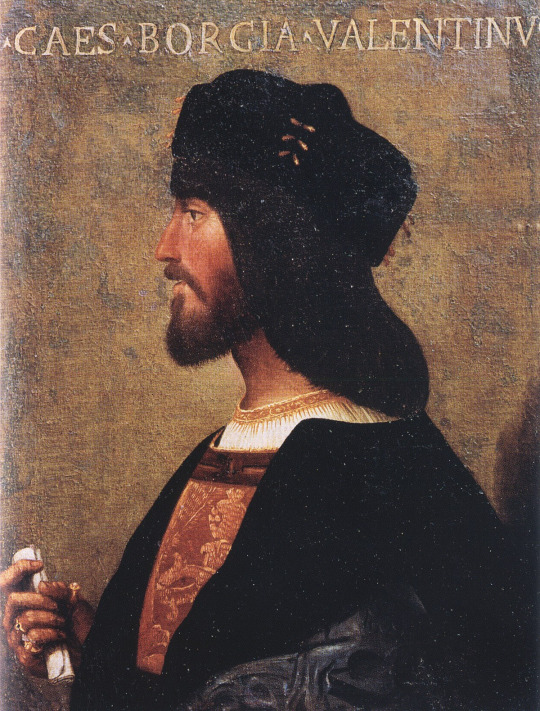
Who was a prince of ‘fortune’ who lost his princedom to trusting the wrong person. What a beard, amirite? What a face. He’s even got the rings! I’m sure this means nothing.)
So basically yeah, Flint is absolutely a Machiavelli bitch.
#anyway talk dirty morally grey philosophy to me!!!#black sails#james mcgraw#captain flint#machiavelli#black sails meta#milos black sails meta#long post#Anonymous
43 notes
·
View notes
Photo

Saint Valentine, Confessor, Martyr - Feast Day - February 14th
Because of his Nuptial Masses, he became the patron of lovers, the affianced, and married couples, and fortuitous to the priest’s association with romance is the belief that halfway through the month of February, birds choose their mates, hence St. Valentine’s association with birds, especially lovebirds and doves. Chaucer mentions this belief in his “Parliament of Foules”:
For this was sent on Seynt Valentyne’s day
Whan every foul cometh ther to choose his mate.
Also fortuitous is the fact that red is both the color of Martyrs and the color associated with love. Red roses are also a symbol of both martyrdom and love, and had also always been associated with the Roman goddess of love, Venus.
To send a very Catholic valentine to someone you love, how about using a paraphrase of today’s Collect as the basis for the text?
Grant, I beseech Thee, O almighty God, that (Name of loved one), who celebrates the heavenly birthday of blessed Valentine, Thy Martyr, may by his intercession be delivered from all the evils that threaten (him/her). Through our Lord Jesus Christ, Thy Son, Who liveth and reigneth with Thee in the unity of the Holy Ghost, one God, world without end.
…with all the personal, mushy stuff at the bottom! For a romantic card for a spouse, some of the poetry found in Solomon’s Canticle of Canticles — a Book which uses marital love as a metaphor for God’s love for His Church — cannot be surpassed for inspiration.
As to foods, oysters, chocolates, champagne, and heart-shaped foods are all considered to be romantic.
Note to men: Don’t forget St. Valentine’s Day. Even the least romantic woman appreciates being remembered on this lovely holy day. One needn’t (shouldn’t!) spend lavish sums and buy into the marketing nonsense that has become associated with all big Christian Feasts, but a single red rose is just as lovely as an $80 dollar dozen, and chocolates in a small box are as delicious as those in a large box; it is the thought that counts. And it costs nothing to tell her you love her…
And a note to all: be sure to wish people “Happy Saint Valentine’s Day” rather than just “Happy Valentine’s Day.” This will help bring the deeper meaning of the day into focus!
by Fr. Francis Xavier Weninger
The holy Priest Valentine lived at the time of the Emperor Claudius. He was held in high estimation, both by the Christians and heathens, on account of his natural amiability, wisdom and virtue. Claudius himself desired to see him, and on his being brought into his presence, said to him: “Why do you refuse to be my friend, when I wish to become yours? Nothing in you displeases me, but that you confess a faith which is against our gods.” Valentine replied: “O Emperor! if you knew the God I worship, you would consider yourself blessed to serve Him. He it is who has given you your life and your crown, and who alone can make you eternally happy.” One of those present interrupted him, saying: “What think you, then, of Jupiter,–of Mercury?” “I think that they have been wicked men, as their lives show,” answered the Priest;” and, therefore, they are unworthy to be called gods.” “That is sacrilege!” cried many: “Valentine deserves to die!” Valentine begged the Emperor graciously to lend him his ear, only for a short space of time, that he might defend his words.
Having received permission to speak, he placed the falsity, of the heathen gods and the truth of the God of the Christians so clearly before their eyes, that the Emperor, prepossessed in his favor, said to those surrounding him: “I must confess this man speaketh with much reason, and nothing can be said to confute his teaching.” Calphurnius, the Governor, who was also present, on hearing the Emperor speak thus, was filled with fear that he would embrace the Christian faith, and cried: “Valentine is a sorcerer, a blasphemer of the gods of the Empire! He must die, or an insurrection will break out among the people!” This speech alarmed the Emperor to such a degree that he gave up the holy Priest entirely into the hands of the Governor.
Calphurnius immediately cast him into a dungeon, and gave orders to Judge Asterius to accuse him as an enemy of the gods, according to law. Asterius wished first to make an attempt to win over the Priest, who was so universally loved, from the Christian faith, but to the good fortune of the judge, the contrary took place. Valentine restored the sight of the daughter of Asterius, who had been blind for many years, and, in consequence, the judge and his whole family forsook their idolatry and were baptized. When this was reported to the Emperor, he admired the power of the God whom Valentine adored, and endeavored to set the Saint free, but again frightened by Calphurnius with an insurrection, he at length gave orders to behead him. Saint Valentine received his death sentence with great joy, and ended his life by a glorious martyrdom.
Sermon by St. Augustine, Bishop
Today we keep our annual celebration of the triumph of the blessed Martyr Valentine, and the Church, while rejoicing in his glory, places him before us, that we may follow in his footsteps. If we suffer with him, we shall be glorified with him. There are two things to be considered in this glorious combat: namely, the hard-hearted cruelty of the torturer, and the unconquered patience of the Martyr–the cruelty of the torturer, that we may detest it; the patience of the Martyr, that we may imitate it. Hear what the Psalmist says in reproof of wickedness: Be not emulous of evildoers, for they shall shortly wither away as grass. But the Apostle teaches patience with the wicked in the words: Patience is necessary for you, that you may receive the promise.
At least three different Saint Valentines, all of them martyrs, are mentioned in the early martyrologies under date of 14 February. One is described as a priest at Rome, another as bishop of Interamna (modern Terni), and these two seem both to have suffered in the second half of the third century and to have been buried on the Flaminian Way, but at different distances from the city. In William of Malmesbury’s time what was known to the ancients as the Flaminian Gate of Rome and is now the Porta del Popolo, was called the Gate of St. Valentine. The name seems to have been taken from a small church dedicated to the saint which was in the immediate neighborhood. Of both these St. Valentines some sort of Acta are preserved but they are of relatively late date and of no historical value. Of the third Saint Valentine, who suffered in Africa with a number of companions, nothing further is known.
9 notes
·
View notes